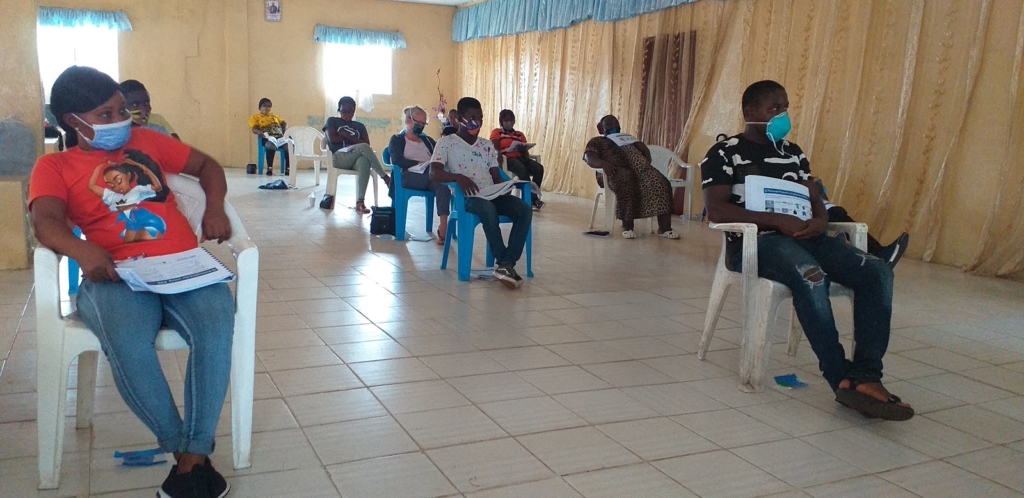Since the beginning of the COVID-19 pandemic, Last Mile Health has partnered with Liberia’s Ministry of Health to design and deliver a comprehensive COVID-19 training focused on prevention measures, case detection and response, and a protocol for ‘no touch’ delivery of primary healthcare services. During the rollout, Last Mile Health trained clinicians and support staff from clinics across four counties in infection prevention and control measures, the foundation of a strong COVID-19 response that ensures the health and safety of both patients and health workers.
As community health workers refer sick patients to the health facility, it is vital that the first line of clinical defense–physician assistants and nurses in rural health facilities–are also empowered to continue serving safely. Below, Diana Dennis, a registered nurse and Quality Assurance Officer at Last Mile Health, reflects on some of the ways the Rivercess County Health Team ensured the frontline health workers participating in the training remained safe.
Have you ever been afraid of getting infected with COVID-19? How would you react if you found out that a colleague you had interacted with was confirmed COVID-19 positive? In Rivercess County, Liberia, we have been working with the County Health Team to mitigate these concerns by implementing infection prevention and control measures that ensure health workers can stay safe while they continue to serve their communities.
Prior to Training
Typically, training activities in Rivercess bring together staff from the facility and community levels. These trainings are the only events that bring health workers and local officials together, so they often include a large group of people cheerfully interacting with one another. This training was different.
By the time the training was hosted, there had been reported cases of COVID-19 in all of Liberia’s counties except for two — including Rivercess. Uncertainty was high; the dynamics associated with group-based training were no longer the same and extreme safety precautions would need to be maintained. Additionally, reinforcing the need for social distancing at all times, in a context where physical contact is a huge cultural marker of love and respect, would require more than just words.
To prepare for the two-day training, we first held a “train the trainer” exercise for County and District-Level supervisors. Then, a day before the training, we visited the building that was rented for the event to ensure the rooms could promote safety precautions. We also set up five different hand washing stations.
Training Begins
Facility staff and Community Health Service Supervisors (who coach and mentor community health workers) were stationed at the building entrance. Dressed in personal protective equipment, they were tasked with checking the temperatures of all facilitators, participants, and visitors who entered the building. Upon entering the building, everyone was required to wash their hands and put on a mask. Compliance was not an issue. As health workers, participants and facilitators alike know that the “safety of one, meant the safety of all.”
To reinforce social distancing, facilitators rented a school building that could accommodate a large group. Participants were separated into three classrooms and placed six feet apart in each class. Separate restrooms and hand washing stations were also set up to ensure proper hygiene procedures.
For meals, both participants and facilitators were required to pick up their pre-packaged food one at a time. Unlike trainings conducted pre-COVID, participants were not allowed to sit together at tables.
Following the completion of the training, everyone is held accountable to ensure these precautionary measures are followed at the community and facility levels. The County Health Team and Last Mile Health staff are working to ensure both the health facilities and Community Health Team observe and take every precaution to protect themselves and their patients. Community supervisors are responsible for ensuring community health workers use all the necessary personal protective equipment while providing health services.
As leaders, it’s essential to maintain the wellbeing of the people you lead. Health worker shortages have posed threats to achieving equity in healthcare delivery. In this case, the loss of health workers isn’t our choice. So, fighting COVID-19 by donning our personal protective equipment and following all of the infection prevention and control measures to keep safe and keep serving will remain our focus.
Last Mile Health has trained nearly 1,500 community and frontline health workers in Rivercess, Grand Gedeh, and Grand Bassa counties, while nationally all community health workers deployed have been trained in the COVID-19 curriculum. To learn more, read our latest Quarterly Report.






